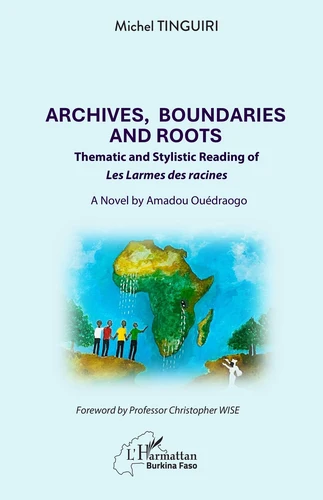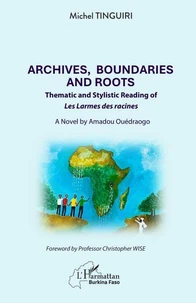Archives, Boundaries and Roots. Thematic and Stylistic Reading of Les Larmes des racines
Par :Formats :
- Paiement en ligne :
- Livraison à domicile ou en point Mondial Relay estimée à partir du 17 décembreCet article sera commandé chez un fournisseur et vous sera envoyé 7 jours après la date de votre commande.
- Retrait Click and Collect en magasin gratuit
- Livraison à domicile ou en point Mondial Relay estimée à partir du 17 décembre
- Réservation en ligne avec paiement en magasin :
- Indisponible pour réserver et payer en magasin
- Nombre de pages220
- PrésentationBroché
- FormatGrand Format
- Poids0.336 kg
- Dimensions15,5 cm × 24,0 cm × 1,2 cm
- ISBN978-2-336-50761-3
- EAN9782336507613
- Date de parution09/01/2025
- CollectionHarmattan Burkina Faso
- ÉditeurL'Harmattan
- PréfacierChristopher Wise
Résumé
The study explores the novel's settings, from Sodeni and Govié to the Upper Savannah and the United States, highlighting the symbiotic relationship between place and identity. It explores Amadou Ouédraogo's use of evocative symbols and metaphors that echo prevalent themes in African literature, including dual identity and post-colonial reckonings, and the emblematic theme of return. The analysis contextualizes the novel within contemporary African literary theory, establishing meaningful connections with seminal thinkers such as Frantz Fanon, Aimé Césaire, and Ngugi wa Thiong'o.
Through multiple theoretical frameworks, including autoethnography, Neo-Fanonism, and Mircea Eliade's conceptualization of sacred and cyclical time, the study positions Les larmes des racines as a significant contribution to African literature, African studies, anthropology, and the broader humanities.
Through multiple theoretical frameworks, including autoethnography, Neo-Fanonism, and Mircea Eliade's conceptualization of sacred and cyclical time, the study positions Les larmes des racines as a significant contribution to African literature, African studies, anthropology, and the broader humanities.
The study explores the novel's settings, from Sodeni and Govié to the Upper Savannah and the United States, highlighting the symbiotic relationship between place and identity. It explores Amadou Ouédraogo's use of evocative symbols and metaphors that echo prevalent themes in African literature, including dual identity and post-colonial reckonings, and the emblematic theme of return. The analysis contextualizes the novel within contemporary African literary theory, establishing meaningful connections with seminal thinkers such as Frantz Fanon, Aimé Césaire, and Ngugi wa Thiong'o.
Through multiple theoretical frameworks, including autoethnography, Neo-Fanonism, and Mircea Eliade's conceptualization of sacred and cyclical time, the study positions Les larmes des racines as a significant contribution to African literature, African studies, anthropology, and the broader humanities.
Through multiple theoretical frameworks, including autoethnography, Neo-Fanonism, and Mircea Eliade's conceptualization of sacred and cyclical time, the study positions Les larmes des racines as a significant contribution to African literature, African studies, anthropology, and the broader humanities.




